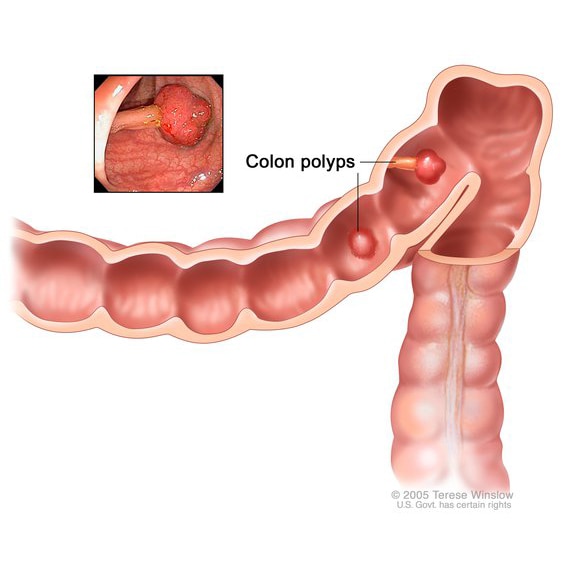Colon Polyps
View or Print All Sections
Definition & Facts
Colon polyps are growths on the lining of your colon and rectum. Most polyps are not cancerous, but some may develop into cancer over time. Removing polyps can help prevent colorectal cancer.

Symptoms & Causes
Most people with colon polyps don’t have symptoms. Experts aren’t sure what causes colon polyps. Research suggests that certain factors, such as age and family history, can increase your chances of developing colon polyps.
Diagnosis
Doctors can find colon polyps only by using certain tests or procedures. Your doctor may take a medical and family history, perform a physical exam, or request a stool test or other tests.
Treatment
Doctors treat colon polyps by removing them. Doctors use special tools during a colonoscopy or flexible sigmoidoscopy to remove colon polyps.
Eating, Diet, & Nutrition
Research suggests eating more fruits, vegetables, and other foods with fiber may lower your chances of developing colon polyps. Losing weight if you’re overweight and not gaining weight if you’re already at a healthy weight may also help prevent polyps.
Clinical Trials
The National Institute of Diabetes and Digestive and Kidney Diseases (NIDDK) and other components of the National Institutes of Health (NIH) conduct and support research into many diseases and conditions.
Related Conditions & Diseases
Related Diagnostic Tests
This content is provided as a service of the National Institute of Diabetes and Digestive and Kidney Diseases
(NIDDK), part of the National Institutes of Health. NIDDK translates and disseminates research findings to increase knowledge and understanding about health and disease among patients, health professionals, and the public. Content produced by NIDDK is carefully reviewed by NIDDK scientists and other experts.

